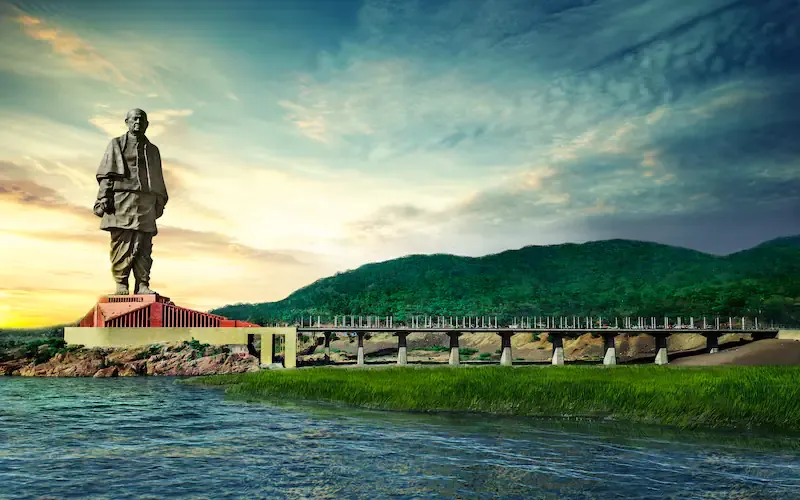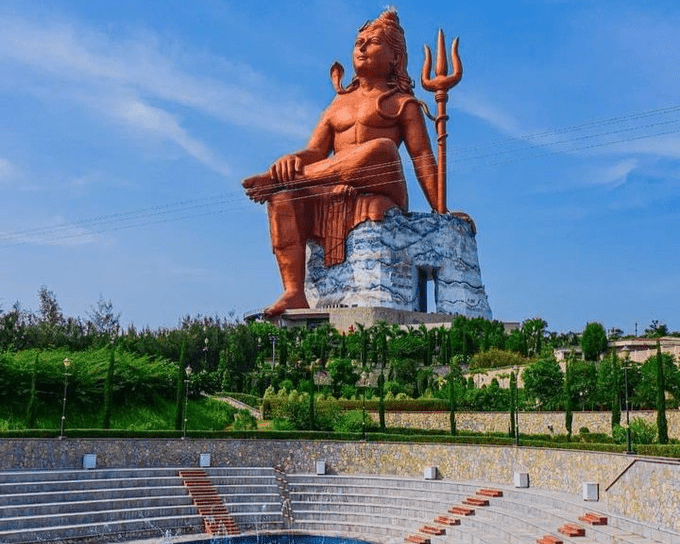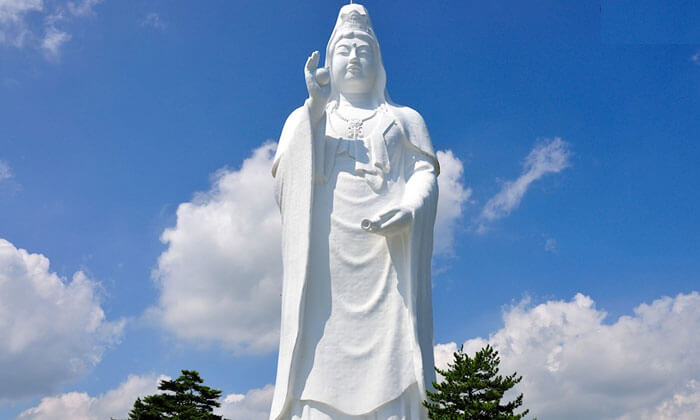The
world’s tallest statues stand as monumental symbols of culture, religion, and
history. From India’s Statue of Unity at 182 meters to China’s Spring Temple
Buddha and Myanmar’s Laykyun Sekkya, each reflects unique narratives and
spiritual significance. These colossal sculptures, attract millions of visitors
annually, offering insights into their respective traditions and philosophies.
Whether depicting deities, leaders, or ideals, these statues evoke awe and
contemplation, transcending their physical heights to embody enduring human
aspirations and achievements. Here are 10 tallest statues in the world:

1. Statue of Unity
The Statue of Unity, located in Gujarat, India, is the world’s tallest statue at 182 meters (597 feet). Inaugurated in 2018, it commemorates Sardar Vallabhbhai Patel, a key figure in India’s independence movement and the country’s first Deputy Prime Minister. Designed by Indian sculptor Ram V. Sutar, the statue stands on a river island facing the Sardar Sarovar Dam. Its imposing height symbolizes Patel’s pivotal role in unifying India. The site has become a major tourist attraction, featuring a museum, a viewing gallery, and various cultural and educational facilities, celebrating India’s rich heritage and history.
2. Spring Temple Buddha
The Spring Temple Buddha, located in Lushan, Henan, China, is the world’s second tallest statue at 128 meters (420 feet). Completed in 2008, it depicts Vairocana Buddha, representing wisdom and enlightenment. The statue stands atop a lotus-shaped pedestal and is part of the Fodushan Scenic Area. Its construction aimed to enhance the local area’s cultural significance and attract tourism, reflecting China’s rich Buddhist heritage.
3. Laykyun Sekkya
The Laykyun Sekkya statue in Khatakan Taung, Myanmar, stands 116 meters (381 feet) tall, making it one of the world’s tallest statues. Completed in 2008, it depicts Gautama Buddha in a standing posture. The statue is accompanied by a reclining Buddha statue nearby. Built atop Po Kaung Hills, it offers panoramic views of the surrounding area, symbolizing peace and serenity, and is a significant cultural and religious landmark in Myanmar.
4. Statue of Belief
The Statue of Belief(Vishwas Swaroopam), depicting Lord Shiva, stands at 112 meters (369 feet) in Nathdwara, Rajasthan, India. Completed in 2020, it is one of the tallest statues in the world. This monumental sculpture portrays Shiva in a seated meditative posture, symbolizing tranquility and spiritual power. The statue is a significant pilgrimage site, attracting devotees and tourists alike. It underscores the cultural and religious importance of Lord Shiva in Hinduism and India’s rich spiritual heritage.

5. Ushiku Daibutsu
The Ushiku Daibutsu, located in Ushiku, Ibaraki Prefecture, Japan, stands 100 meters (330 feet) tall, making it one of the world’s tallest statues. Completed in 1993, it depicts Amitabha Buddha, symbolizing infinite light and life. Visitors can explore the statue’s four levels, featuring a museum, an observation deck, and a tranquil garden. The statue’s immense size and serene presence highlight Japan’s rich Buddhist traditions and attract both pilgrims and tourists from around the world.
6. Sendai Daikannon
The Sendai Daikannon, standing at 100 meters (330 feet) in Sendai, Japan, is one of the tallest statues globally. Completed in 1991, it depicts Kannon, the Buddhist Goddess of Mercy, holding a gem in her hand. Visitors can explore the statue’s interior, which houses numerous Buddha statues and offers panoramic views from its top. This towering figure symbolizes compassion and protection, reflecting Japan’s deep-rooted Buddhist traditions and attracting both spiritual seekers and tourists.
7. Guanyin of Nanshan
The Guanyin of Nanshan, located in Sanya, Hainan, China, stands 108 meters (354 feet) tall, making it one of the tallest statues in the world. Completed in 2005, it depicts Guanyin, the Bodhisattva of Compassion, with three serene faces. Positioned on a lotus pedestal extending into the South China Sea, the statue symbolizes peace, wisdom, and mercy. It is a significant pilgrimage site and tourist attraction, reflecting China’s rich Buddhist heritage and cultural reverence for Guanyin.
8. Great Buddha of Thailand
The Great Buddha of Thailand, also known as Phra Buddha Maha Nawamin, stands 92 meters (302 feet) tall in Ang Thong, Thailand, making it one of the tallest statues in the world. Completed in 2008, it depicts a seated Gautama Buddha. This monumental statue, painted in gold, serves as a significant religious and cultural symbol. It attracts numerous pilgrims and tourists, embodying Thailand’s deep-rooted Buddhist traditions and the reverence for the Buddha’s teachings.
9. Dai Kannon of Kita no Miyako Park
The Dai Kannon of Kita no Miyako Park in Ashibetsu, Hokkaido, Japan, stands 88 meters (289 feet) tall. Completed in 1989, it depicts Kannon, the Buddhist Goddess of Mercy. Visitors can explore the statue’s interior, which houses numerous religious icons across 20 floors. This towering statue is a significant cultural landmark, reflecting Japan’s Buddhist heritage and symbolizing compassion, attracting both devotees and tourists to the region.

10. Motherland Calls
The Motherland Calls is a monumental statue in Volgograd, Russia, standing at 85 meters (279 feet) tall, symbolizing the Soviet Union’s defense against Nazi invasion during the Battle of Stalingrad. Completed in 1967, it portrays a defiant female figure wielding a sword, representing the courage and sacrifice of Soviet soldiers and civilians. The statue stands atop Mamayev Kurgan, offering panoramic views of the city. It remains a poignant memorial to the Battle of Stalingrad and a symbol of Russian resilience and victory in World War II.
These statues are monumental both in size and cultural
significance, representing various figures from history, mythology, and
religion.
Until next time Keep
travelling and take care of Nature.
Pingback: Must Visit Places in China - Shruti's Fairytales